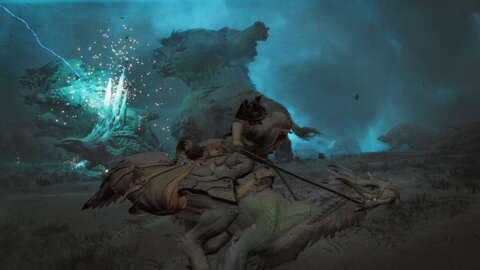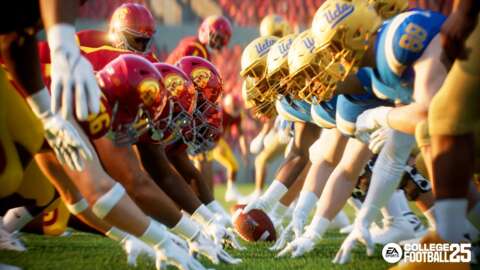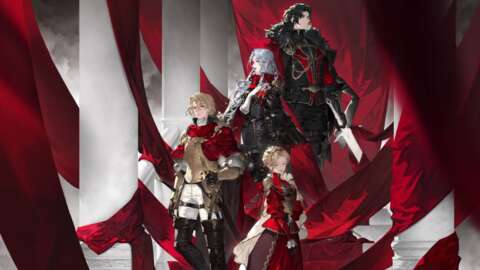Monster Hunter Wilds will throw more monsters at you at once, thanks to the power of the current generation of consoles. Capcom has said that Wilds will feature herds of large monsters, giving players more monsters to contend with during each hunt.
In an interview with GameSpot, which you can read the entirety of below, Monster Hunter Wilds director Yuya Tokuda said that the game will blow past the limitations of previous entries. Instead of the max of three monsters running around at once during a hunt there will now be herds of large monsters, similar to herds of smaller monsters present in previous games. Now when you reach your target, you may have to contend with multiple of that monster at once. There will also be even more large monsters around, which Tokuda said will create more dynamic moments in the gameplay.
Tokuda said that, for example, the lightning monster shown during the Summer Game Fest trailer is an apex monster and the way it interacts with other monsters can change based on the number and type of monster present. It will also act differently depending on the environment, which can change thanks to weather and other shifting aspects. Tokuda said that all of this comes together to really make the upgraded environments really shine in Monster Hunter Wilds.
Tokuda said this as part of an interview with GameSpot’s Jean-Luc Seipke, alongside Monster Hunter Wilds executive director and art director Kaname Fujioka and Monster Hunter series producer Ryozo Tsujimoto. You can read the interview in its entirety below. Monster Hunter Wilds launches in 2025 on Xbox Series X|S, PlayStation 5, and PC.
This interview has been edited for clarity and length.
GameSpot: Where were you able to elevate aspects of Monster Hunter, both in gameplay and presentation, since this is the first entry built for Xbox Series X|S and PlayStation 5?
Kaname Fujioka: Yeah, so thank you for your question. So really what we’ve been able to accomplish with the new hardware is a lot of what we’ve been able to show you so far with the, first of all, the dynamic environmental changes that are part of the overall concept of the game, which is really exemplified in the contrast that we’re trying to strike with the sense of dangerous and aggressive, intimidating nature, contrasted with the bountiful environments that we’ve been able to show you. All of that is dispersed and explicitly possible with the new hardware that is available to us now.
That also includes the number of monsters that we’re able to present in the game and how they pack and they herd into large groups, not only with the amount of numbers that we’re showing you, but also the precise behaviors that they each have. They all have their own desires, their own unique identities, behaviors, and this large-scale environment that’s not only filled with monsters, but also filled with humans, all real time dynamically changing environment. So that seamlessness and the real time dynamic changes, everything’s always moving together, interacting with each other, that’s all maybe made possible by the new hardware available to us.
Are there any interesting ways the team wants to have the monsters and even the humans now interact with each other almost dynamically in Monster Hunter Wilds?
Yuya Tokuda: Yeah, thank you. Really, what we were trying to present with the monster actions is just powered up nature of the ecosystems that we’ve been able to express in the game. Up until now, we’ve only really been able to display three monsters of three different types in the field, but now that’s really ballooned into these packs and herds of monsters at the… that you’ve been able to see, kind of what we’ve been able to do in previous games with small monsters now on a much larger scale with large monsters also interacting in these huge groups of monsters.
So being able to really detail or express these ecosystems in a really detailed fashion is what we’ve been really excited to be able to accomplish here with Wilds. So for example, what you were able to see with the sandstorm and the Apex Monster that appeared there, that lightning-based monster, and how it interacts with the other monsters that appear only in certain kinds of the environment, that kind of dynamism, that kind of constantly changing environment is something that we’ve been really able to accomplish and we really want to push that aspect.
And specifically one thing that we’re excited about in some of the smaller interactions with the monsters is seeing the small monsters latch onto, jump onto and invite the larger monsters and that thing happens more dynamically and more naturally.
Were there any major lessons or fan feedback from Monster Hunter Worlds or Rise that the team wanted to integrate into Wilds?
Tokuda: Yeah, we really valued the input and opinions of players from Worlds and Rise, and listening to that as we approach and design Monster Hunter Wilds. To get into specifics, for example, now that the map is a lot bigger, we were really focused on making it easier for players to navigate the world, not just in terms of the geography but the verticality as well. There are definitely instances in previous games where players, they did have the Scout Flies guiding them towards the monsters, but there might’ve been situations where a monster moved locations and on the way there the monster’s no longer there, it’s moved somewhere else.
But now with the introduction of the Sacred as a trusty mounting support, it can automatically move toward your quest target or the quest monster, making it much, much easier to stay in the hunt and know how to get to where you’re going. Not only that, but the map as well, it’s a lot more detailed, it has a lot more features that also illustrate the verticality and the environments, so making it much, much easier for players to get around.
But yeah, we’ve really been trying to really introduce the game with a lot more qualitative improvements, so we’re listening to players’ feedback.
In Monster Hunter Worlds players would have to wait for a mid-mission cutscene before they could join co-op. Has the team made co-op more seamless for story missions?
Tokuda: Yeah, we’ve definitely taken that feedback to heart. And while we can say that the story really… We’ve done a much, much deeper guidance to the story this time around, we’re really trying to expand on the immersive story experience for players and that’s part of the concept of the seamlessness of the world and transitioning from the cutscenes right into the gameplay back into the action.
So we’ve really powered up that aspect of it, but at the same time we’ve been listening to the feedback of the player and the ability, and so while we can say that there will be some segments where you have to witness certain parts of the story before you can actually start some of those co-op elements, in the background we’ve taken care to make sure that players are always connected or they can stay always connected in terms of co-op parties and there’s a lot more features now to match up… That background matching is always going on, so players will be notified as soon as they can do quests together and do gameplay together, and it’s been made a lot more convenient and easy to do all around. So they’ve taken care to design the story with that in mind.
So you can rest easy in that multiplayer, that co-op aspect and that multiplayer aspect is something we’ve taken care to incorporate inside this game.
Are there any changes to the weapons or move sets in Monster Hunter Wilds that the team is really excited about?
Tokuda: On the whole… Well, to summarize what’s going on in Wilds is we are presenting the full lineup of 14 different weapon types and each of those different weapon types is going to have new moves, new action, new mechanics. One of the major things that’s shared among all the new updated weapons is that there were going to be moves now where in previous games you had to be stationary when the moves were executed. Now there’s more positioning available you can move while performing those moves to allow you to better yourself towards monsters. So on the whole, everything has been updated with that in mind.
And in terms of specific weapon style mechanics, some of the greatest changes that are made to the Light Bowgun, Heavy Bowgun, and the Hunting Horn, we’ve done a really kind good job in making sure that they all feel a lot better, a lot crunchier here in Wilds. So we really think that you can look forward to that.
So we’ve also started to reveal some of the weapons as well, but one of the biggest things as well with all the weapon type changes is that there’s now a focus mode that allows you to aim attacks in the guards, but also it allows you to perform attacks towards… that cause extra damage. And those special attacks that are available in focus mode lead into all kinds of new combos as well. And there’s also… Or I guess this is a temp term here, but basically a weakness exploit attack basically that is possible with the focus mode, so that’s also a major part of the updates weapons as well.
Both Monster Hunter World and Rise featured a ton of post-launch content, including crossovers with other games. Will Monster Hunter Wilds receive a similar level of post-launch support?
Ryozo Tsujimoto: Yeah, I think it’s a good question. If you’ve been following the Monster Hunter series, then you’ll know that we really do take a lot of care to give the players a lot of content that they can enjoy, even after the game’s released. But really, yeah, we can only stress that we’ve only been able to show you a fraction of the game and we’re really hyper-focused right now on delivering the best product possible for the main game, right?
So you can definitely expect us to keep players interest and keep players really into the experience, even after the release. But for now we’re still just putting our nose to the grinder for the main game and trying to build the best game there.
Of the monsters already shown, what new moves are you excited about and how do these monsters fit into the larger ecosystem of Monster Hunter Wilds?
Fujioka: Basically, it’s a difficult question to answer because there’s so much about the monsters that we want to show that we like in what we’ve been able to do. But one of the things that first mentioned is basically how we’ve been able to show the differences in monster characteristics and how the monsters behave and act in the ecosystem depending on some of the new herding mechanics, for example, how threatening some monsters are and how that threatening level increases when they’re in larger herds and larger numbers, versus how they can still have different characteristics expressed when they’re on their own. So some of the… for example, when they herd, they behave a bit differently when they are on their own. But you can also expect that all of the individual monsters that, they also have their own unique characterization, they have their own unique characteristics expressed very in fine detail with a lot of care taken to them.
For example, the Apex Monster that you’ve been able to see in the Woodward play that we’ve shown you, that flying monster with the lightning attacks, that monster, for example, is something that we’ve taken a great liking to and we expect a lot of that Monster Hunter level attention to detail and the way that it behaves individually.
So you can look forward to that. Another aspect personally that… is looking forward to is that he’s taken a lot of care… has taking a lot of care into how the main monster, which we haven’t been able to show you details about the main monster yet, but how it’s integrated into the story and how its ecology is also built into the nature of the story and how that unfolds is something that we’ve really liked how it’s turned out. So we can’t wait to show people how that’s going to look.
Monster Hunter Wilds has a big emphasis on mounts, including combat while riding. How much of that is in the game and are there monsters where you would want to be mounted the entire fight?
Tokuda: Yeah, so really to put it as simply as possible, the basic concept of dismounting or being on the ground during combat is unchanged. That is still the basic overlying principle of hunting and Monster Wilds. The Sacred is designed as a [mount] first and foremost, and if you get the chance, you’ll probably see us a bit more in the demo play if you get the chance to see that. But it’s a support role for the player. So the Sacred will come in when the player is in trouble, when they’re in a pinch to help out. You can mount it quickly to gain some distance and to reposition yourself. And this is built into the groundwork of what the Sacred accomplishes.
For example, you’ll get supplies into the Sacred pouch at the start of a quest. It’ll have extra supplies for you. It has a weapon sling that allows you to switch very quickly between your main and your sub weapon.
And that support role is integrated into just how it’s been designed. The Sacred itself doesn’t actually attack monsters, and so when you can perform some mounted attacks while you’re on the Sacred, those mounted attacks fit the purpose of providing extra mobility for you as you’re in the hunt, or for leading monsters away or quickly getting from point to point. And that’s also expressed in the fact that you can get onto the Sacred quickly to gather material with the Hook Slinger and to use that quickly as a Slinger shot, and things like that. So, the Sacred is allowing for all of that, and it gives you more options but it’s not really going to be based around the mounted test.



